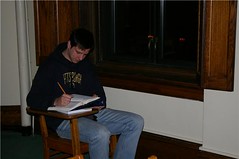With the spring semester quickly taking off at Seton Hill University (SHU), there have been frequent complaints from students concerning the number of night classes currently offered this semester and their scheduling conflicts. This has been an increasing problem for students majoring in English or education, and even more difficult for those in both.
By Maddie Gillespie
Layout Editor
With the spring semester quickly taking off at Seton Hill University (SHU), there have been frequent complaints from students concerning the number of night classes currently offered this semester and their scheduling conflicts. This has been an increasing problem for students majoring in English or education, and even more difficult for those in both.
Night classes typically run from 6 p.m. to 8:30 p.m. SHU now offers night classes Monday through Thursday. Students who are double majoring or in SHU’s education program may be taking up to four night classes every week throughout a semester. Angela Palumbo, a sophomore, said, “[Spring] semester I have four night classes! That means that my nights are shot every night of the week except Friday.”
Michael Arnzen, an associate professor of English, expressed a similar sentiment: “The main drawback for me is that my whole home life has to change to accommodate a full day on campus that extends into the night. Same might be true for students; those you live with have to change how they make plans to spend time with you.”
Ellen Einsporn, a junior and lacrosse player, said, “My biggest problem with night classes is their inflexibility – they only meet once a week. Missing even a single class is a huge hindrance.” Missing a class for an athletic game is feasible when taking day classes, but becomes problematic when a class only meets once a week.
In order to compensate for the fact that students inevitably miss night classes, whether for athletic or health reasons, some students have had to take summer courses at other institutions in order to fulfill their graduation requirements.
“This is something that should not happen – to be forced to attend another institution over the summer because Seton Hill does not offer the courses I need to graduate when I need them. Isn’t that what I’m paying tuition for?” said Einsporn.
Collin Wansor, an associate professor of English, believes that there are some students that prefer night classes: “Some students say they do, the adult non-traditional students especially, but other students find them inconvenient because of how they interfere with job commitments.”
“Night classes help accommodate working students or those who have family obligations during the daytime, more than anyone else, I think,” said Arnzen.
It might make for some very long days, but “…there may be some sort of psychological advantage in that students may not feel as if the burdens of the day are still ahead of them – sort of a closure on the misery effect,” said Wansor.
Night classes are also excellent opportunities for professors to utilize videos or to create strong discussions without having to worry about an ending time limit. Arnzen said, “A three-hour section that meets once per week is ideal for film courses because it allows us to watch a full movie and have time to talk about it. The same goes for literature classes where we are reading a novel a week. The three-hour section allows us to go deep into our conversations, and to cover more material in the readings.”
Audrey Quinlan, an associate professor of education, said, “If the group is enthusiastic and energetic, the time of day really does not matter.”
